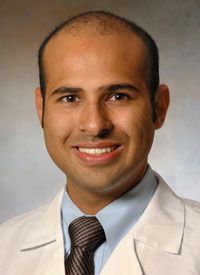Cancer Treatment's New Side Effect: Financial Toxicity
With the cost of cancer care ever rising, a team of cancer specialists at the University of Chicago has developed a tool to help measure a patient's risk for and ability to tolerate financial stress.
Jonas de Souza, MD, a head and neck cancer specialist at the University of Chicago Medicine

Jonas de Souza, MD
With the cost of cancer care ever rising, a team of cancer specialists at the University of Chicago has developed a tool to help measure a patient’s risk for and ability to tolerate financial stress.
The tool, a set of 11 questions called COST (COmprehensive Score for financial Toxicity), was assembled and refined from conversations the authors had with more than 150 patients with advanced cancer. COST is designed to assess a patient’s ability to deal with financial toxicity—the expense, anxiety, and loss of confidence confronting those who face large, unpredictable costs, often compounded by decreased ability to work.
"Few physicians discuss this increasingly significant side effect with their patients," study author Jonas de Souza, MD, a head and neck cancer specialist at the University of Chicago Medicine, said in a statement. "Physicians aren't trained to do this. It makes them, as well as patients, feel uncomfortable," he said. "We aren't good at it. We believe that a thoughtful, concise tool that could help predict a patient's risk for financial toxicity might open the lines of communication. This gives us a way to launch that discussion."
This new side effect may even extend beyond treatment. A recent study from the Centers for Disease Control and Prevention found that 30% of cancer survivors are not able to return to work, or have decreased ability to work. Annual medical expenditures increase by more than $4000 for men who have had cancer and by nearly $3300 for women.
And with the cost of cancer care rising faster than the cost of healthcare, and the cost of new cancer drugs is rising faster than the cost of overall cancer care, this may be a perfect storm for an increase in “financial toxicity.”
"We need better ways to find out which patients are most at risk," de Souza said. "Then we can help them get financial assistance. If patients know what to expect, they may want their physicians to consider less costly medications."
In order to develop the COST questionnaire, de Souza and colleagues spoke with 20 patients and six cancer professionals, as well as nurses and social workers to produce a list of 147 questions. The researchers pared the list down to 58 questions. Then, they asked 35 patients to help them decide which of the remaining questions were the most important. The patients narrowed the list down to 30.
"In the end, 155 patients led us, with some judicious editing, to a set of 11 statements," de Souza said. "This was sufficiently brief to prevent annoying those responding to the questions, but thorough enough to get us the information we need."
For each question, patients choose from five potential responses: not at all, a little bit, somewhat, quite a bit, or very much.
Learning how a patient responds may help caregivers determine who is likely to need education, financial counseling, or referral to a support network. The quiz may also predict who is likely to have problems and will require interventions.
The researchers are now conducting a larger study to validate these findings and correlate the newly developed scale with quality of life and anxiety in cancer patients.
"We need to assess outcomes that are important for patients," de Souza said. The cost burden cancer patients experience is definitely one. Measuring this toxicity is the first step towards addressing this important issue. “At the end," he added, "this is another important piece of information in the shared-decision-making process."
A description of the tool is featured in the July 2014 issue of the journal Cancer.


